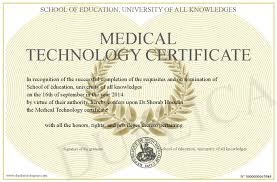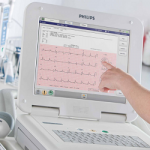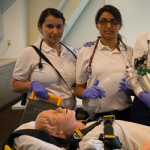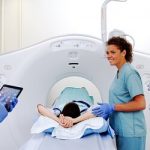What is a Medical Technologist?
In a hospital setting, you may be familiar with nurses and doctors, but a Medical Technologist is not so well-known behind the scenes role.
Most Medical Technologists work in labs or clinics, where they provide several different tests on patient samples.
Samples can range from blood to urine, or other bodily fluids, as well as testing body or skin tissue.
Having a career as a Medical Technologist means that you must be efficient in chemistry and biology, as well as the medical field.
Duties
There are a number of tasks that are assigned to a Medical Technologist on a daily basis.
In a typical lab, most Medical Technologists will:
- Determine normal and abnormal components of body fluids
- Analyze blood samples
- Prepare blood, platelets, and plasma for transfusion
- Prepare reports
- Maintain laboratory supplies
- Provide medical technologist information to patients
- Assist the medical team with diagnosis and treatment
Salary
Most Medical Technologists that work in the United States make about $57,800 a year.
After many years of experience, certification, and specializations, it’s possible to make more than $79,340 a year.
If you are looking to start your career as a Medical Technologist, you should expect a salary closer to $30,280 to begin.
There are chances to earn raises and promotions in this career, which will allow for higher salaries.
Having a Bachelor’s degree can help with promotions and can lead to senior roles in the medical field.
The best way to earn a higher salary is to earn certification and have hands-on experience.
Annually National Average Salary: $62,870
Average Annual Salary by State
| State | Avg. Annual Salary |
|---|---|
| Alabama | $49,700 |
| Alaska | $69,270 |
| Arizona | $63,710 |
| Arkansas | $51,590 |
| California | $73,560 |
| Colorado | $67,460 |
| Connecticut | $76,190 |
| Delaware | $70,410 |
| District of Columbia | $71,690 |
| Florida | $58,450 |
| Georgia | $63,270 |
| Hawaii | $67,170 |
| Idaho | $51,910 |
| Illinois | $64,850 |
| Indiana | $56,680 |
| Iowa | $54,770 |
| Kansas | $59,780 |
| Kentucky | $56,820 |
| Louisiana | $60,120 |
| Maine | $65,810 |
| Maryland | $60,640 |
| Massachusetts | $70,270 |
| Michigan | $59,140 |
| Minnesota | $65,900 |
| Mississippi | $45,820 |
| Missouri | $57,840 |
| Montana | $66,350 |
| Nebraska | $62,320 |
| Nevada | $62,620 |
| New Hampshire | $74,920 |
| New Jersey | $70,800 |
| New Mexico | $52,660 |
| New York | $81,930 |
| North Carolina | $56,990 |
| North Dakota | $63,070 |
| Ohio | $60,570 |
| Oklahoma | $55,780 |
| Oregon | $76,830 |
| Pennsylvania | $60,940 |
| Rhode Island | $72,200 |
| South Carolina | $54,370 |
| South Dakota | $56,340 |
| Tennessee | $59,330 |
| Texas | $57,080 |
| Utah | $52,320 |
| Vermont | $75,660 |
| Virginia | $61,810 |
| Washington | $70,670 |
| West Virginia | $59,250 |
| Wisconsin | $59,520 |
| Wyoming | $60,900 |
| Puerto Rico | $38,260 |
| Virgin Islands | $51,780 |
Annual Average Salary: Top 5 States
The top earning state in the field is New York, where the average salary is $81,930.
These are the top 5 earning states in the field:
* Employment conditions in your area may vary.
How to Become a Medical Technologist
Step 1 Earn a Degree
In order to become a Medical Technologist, you must have a Bachelor’s degree in medical technology or a related major in life science.
On average, a Bachelor’s degree takes about four years to finish.
Through a typical medical technology program, you can expect courses like:
- Biology
- Chemistry
- Healthcare ethics
- Biostatistics
- Genetics
- Mycology
- Phlebotomy
- Immunology
At some colleges, there are online programs where you can learn right from your own home.
If you are interested in online learning, make sure that all of your lab work is done in-person to gain hands-on experience.
There are also some programs that may take less time if you already have an Associate’s degree.
Developing great math and science skills are necessary for this type of degree.
Step 2 Become Licensed
Once you earn a degree, you will need to look into whether or not your state requires that you become licensed.
There are currently eleven states that require licensure:
- California
- Florida
- Georgia
- Hawaii
- Louisiana
- Montana
- Nevada
- New York
- North Dakota
- Tennessee
- West Virginia
If you currently live in a state that does not require licensure but plan to live and work in a state that does, you will need to become licensed.
The American Society for Clinical Laboratory Science will have more information, but if your state requires licensure, you will likely be required to:
- Pass an exam
- Have at least 12-24 contact hours in the last two years
- Pay the $25-$100 fee
- Have graduated from a Bachelors degree program in the last 24 months
Step 3 Gain Experience
If you didn’t need to gain licensure to work in your state, then you are ready to start your career as soon as you have that degree in your hand.
However, there are some Medical Technologists that choose to do internships or shadow senior Medical Technologists in order to become more familiar with their work.
The school you attend for your medical technology degree can possibly set you up with an internship or other experience.
There are some other places to gain experience as well:
- Clinics as a medical technician
- Assisting in a laboratory
- Work as a patient care technician
Taking the time to learn the career before applying for a job will increase your hiring odds.
Those with experience are also eligible to become certified as a Medical Technologist.
Step 4 Become Certified
After a couple of years of working as a Medical Technologist, you can become certified in the field.
Two accredited and widely accepted associations for Medical Technologists certifications are:
- The American Medical Technologists
- American Society for Clinical Pathology
The American Medical Technologists association offers the Certified Medical Technologist credential.
To earn this certification, you must have a Bachelor’s degree as well as clinical experience.
It’s also necessary to pass the AMT Medical Technologist Exam.
The American Society of Clinical Pathology offers several certifications for Medical Technologists:
- Blood Banking
- Chemistry
- Hematology
- Molecular Biology
- Cytogenetics
Each one of these can be earned by taking an exam, and they are good for five years.
After which you must recertify.
Popular Programs
Education
If you are on the road to becoming a Medical Technologist, you will want to earn a Bachelor’s degree.
This is because the career is heavily based on science, chemistry, and biology in particular, which a medical technology degree is perfect for.
A Bachelor’s degree in medical technology takes around four years to complete for full-time students, and that includes any clinical labs or internships.
It’s typical that you will take several science courses in a medical technology program, but some other courses that you should expect are:
- Hematology
- Genetics
- Cell Structure and Function
- Immunology
- Clinical Microscopy
- Statistics
- Lab Management
With a Bachelors degree in medical technology, you can expect several career opportunities, including:
- Senior Researcher
- Lab Manager
- Clinical Supervisor
- Lab Operator in a Diagnostics Lab
- Medical Lab Scientist at a Hospital
Having classroom time can be done online or in person, but make sure that when you do lab work it is done at an actual lab or clinic.
This is to ensure you understand how to perform specific procedures with hands-on experience.
Your college or university should be able to help you set this up.
Have you already earned a Bachelor’s degree in medical technology and want to expand your career further?
You may be interested in earning a Master’s degree, which can provide even bigger promotions and raises as a Medical Technologist.
A Master’s degree program can take about two years to finish, which will include much more information about the medical field, as well as chemistry and biology.
The courses to expect in a Masters level program include:
- Virology
- Protein chemistry
- Healthcare financial operations
- Enzymology
- Computer-based instrumentation
Most Master’s level programs require a lot of independent research as well.
Some Masters level programs also provide certification through the program, so this is something to look into as well.
If your state requires licensing, you should apply before graduating from your Bachelor’s degree program is finished.
Video About The Career
Licensing and Certification
Earning certification as a Medical Technologist isn’t necessary to gain employment, but many hospitals and laboratories prefer to employ those with credentials.
One thing that may be required in several states is licensure.
11 states require that Medical Technologists hold licensure, these states are:
- California
- Florida
- Georgia
- Hawaii
- Louisiana
- Montana
- Nevada
- New York
- North Dakota
- Tennessee
- West Virginia
The application requirements for each of these states may be different, but most of them require that applicants have a Bachelor’s degree, and at least 12 hours of clinical experience as a Medical Technologist.
After passing an exam, you can work as a licensed Medical Technologist in the state in which you passed the exam.
After two years of experience working as a Medical Technologist, you can become certified by several associations, but you must make sure they are accredited.
Two associations that have accreditation for Medical Technologists are:
- The American Medical Technologists
- The American Society for Clinical Pathology
Each of these associations has its own certifications, which have individual requirements.
The American Medical Technologist association offers The Medical Technologist certification.
In order to be eligible for this certification, you must possess at least a Bachelor’s degree in medical technology or another life science.
You also must have laboratory training through a career, not just through school.
This certification costs $200 to apply for, once you meet the criteria you will receive confirmation that you can take the exam.
The exam is multiple-choice and consists of many topics:
- General Laboratory
- Clinical Chemistry
- Hematology
- Coagulation and Hemostasis
- Immunology and Serology
- Blood Banking and Transfusion
Once you pass the exam, you will be considered certified as a Medical Technologist.
This certification requires you to recertify after 5 years.
The American Society of Clinical Pathology has several areas to certify in:
- Blood Banking
- Technologist in Chemistry
- Technologist in Cytogenetics
- Cytotechnologist
- Technologist in Hematology
- Technologist in Microbiology
- Medical Laboratory Scientist
- Technologist in Molecular Biology
- Histotechnologist
Every certification requires a $240 non-refundable application fee.
Before taking the exam, you must have a Bachelor’s degree and a specific amount of experience, depending on the certification.
In order to become certified, an exam must be taken and passed.
Depending on the certification, the exam may differ, but most are multiple-choice and can be taken at your local community college.
Certification Example:

Average Training Program Duration: 4+ Years
The best training when working as a Medical Technologist is on the job.
Most associations that are accredited for certifying Medical Technologists require around two years of experience before being eligible to apply for certification.
This means that you will need to have two years of work experience in a lab, hospital, or other medical facilities in order to be eligible to gain certification.
Once you are eligible, certification may take several weeks to a couple of months to achieve.
Job Outlook
Those who work as Medical Technologists in labs across the United States should not worry about losing the career anytime soon.
This career will rise around 11 percent over the next ten years, the growth is due to the aging population and technology advancements.
The baby boomer generation is growing older, which means they will need medical care for diseases like diabetes, cancer, and other issues.
Also, advancements in technology have provided many different areas of study, including prenatal.
Most job prospects will go toward people who earn a Bachelor’s degree or an equivalent in the field of medical technology.
Employment Growth Projection: 11%
2020
2030
That's a higher than average projected growth of 36,500
Should You Become a Medical Technologist?
Overall Satisfaction: High

Working in the medical field means that you get to help people every day, and as a Medical Technologist, that feeling makes the job enjoyable.
Not only that, but many Medical Technologists enjoy the hours, but do believe that there is quite a lot of stress in this career.
Overall, the career satisfaction for Medical Technologists is high.
The people most suitable for this career are those who are good with practical, hands-on jobs where problem-solving is the main focus.
Average Salary: Medium

On average, a Medical Technologist will make around $57,800 a year in the United States.
That is typically after a couple of years of experience in the field, when just beginning a career as a Medical Technologist, most people make closer to $30,280 a year.
After certification, many years of experience, and other promotions, it’s possible to make over $79,340 a year in some areas as a Medical Technologist.
Medical Technologists working in large hospitals in California will make around $62,000 a year, while those working in smaller populations, like Delaware, will make closer to $51,000 a year.
Job Growth Outlook: High

The growth of this career will be outstanding over the next several years.
Until about 2030, the career of a Medical Technologist will rise around 11 percent.
Due to technological advancements, it’s now possible to do more tests to determine illnesses.
This has created many more jobs for Medical Technologist, and this trend will likely not end any time soon.
Expect to be able to find job opportunities as a Medical Technologist in large cities and around hospitals or even universities.
If you are looking to start a career as a Medical Technologist, now is a perfect time.
Education Duration: 4+ Years

In order to be a successful Medical Technologist, it is important to earn a Bachelor’s degree in medical technology.
Most Bachelor’s degree programs for full-time students take about four years to finish.
For part-time students, it can take roughly 5 to 6 years to complete a Bachelor’s degree.
Certification and licensing, which may be required in some states, can take anywhere from one to two years to be eligible for.
It can take anywhere from 4 to 6 years to become a Medical Technologist.
Personal Skills Needed

Having a career as a Medical Technologist doesn’t just mean you need to be good at chemistry and math, some other personal skills you should have for a successful career include:
- Leadership skills
- Incredible communication skills
- Ability to work alone and with a group
- Critical thinking skills
- Problem-solving skills
- Empathy
- Stamina
- Technology knowledge
- Detail-oriented
- Strong analytical thinking skills
As a Medical Technologist, you could make a difference in someone’s life.
This career can be stressful, but developing these qualities can help you succeed.
Frequently Asked Questions
What is the average salary of a Medical Technologist?
On average across the United States, Medical Technologists make close to $57,800 a year.
Those who have worked as Medical Technologists for many years, and who have certifications or specializations, can make over $79,340 in some areas.
When just starting out in this career, Medical Technologists will typically make around $30,280.
Promotions and raises are easy to obtain in this career with further education and certification.
How long does it take to become a Medical Technologist?
In order to gain employment as a Medical Technologist, you must have a Bachelor’s degree, at least.
On average, a Bachelor’s degree takes four years to complete for full-time students.
If you are interested in expanding your career even further as a Medical Technologist, it’s possible to earn a Master’s degree as well.
This degree can take about two years to finish.
Typically, it takes anywhere from four to six years to become a Medical Technologist.
What does a Medical Technologist do?
A Medical Technologist is a behind-the-scenes operator at a hospital or clinic.
These skilled scientists analyze patient samples to determine illness, disease, or other issues.
They then consult with doctors and team members to make sure that the patients get the treatment that they need.
This career requires a high skill level in science and math.
What is the demand for Medical Technologists?
It seems that this career will grow in popularity over the next decade.
This is due to the aging baby boomer population, as well as advancements in technology.
If you are interested in becoming a Medical Technologist, you should know that this career is expected to grow around 11 percent.
Compared to other careers in the medical field, this is quite a bit.
How much does it cost to become a Medical Technologist?
In order to work as a Medical Technologist, you must have a Bachelor’s degree.
Most Bachelor’s degree programs in the United States cost around $35,000 to $45,000.
Public universities may be less than private colleges, so these numbers could vary.
For those who go for a Master’s degree, this can be an additional $25,000 to $30,000.
After a Bachelor’s degree and a Master’s degree, it can cost anywhere from $55,000 to $80,000 to become a Medical Technologist.
Medical Technologist Resources
- 18 Pros and Cons of Being a Medical Technologist
- How Much Does Medical Technologist School Cost?
- Online Medical Technologist Training Programs
More Medical Careers
| Career | |
|---|---|
 | Certified Nursing Assistant Working as a Certified Nursing Assistant is an entry-level role that will give you hands-on experience when you are ready to take the next step in your medical career. |
 | Dental Assistant Dental assistants help dentists to provide patient care, keep records, and care for the dental equipment. |
 | Dental Hygienist Dental hygienists take care of cleaning teeth to promote hygiene and help avoid cavities and gum problems. |
 | Dialysis Technician Dialysis technicians maintain and monitor dialysis equipment, and also act as primary caregivers for patients undergoing dialysis treatment. |
 | Dog Groomer Dog groomers attend to grooming dogs, usually at dog salons or big pet-related chain stores. |
 | Healthcare Administrator Healthcare administrators – also known as healthcare executives or health services managers – are responsible for the planning, direction, and coordination of medical and health services. |
 | Home Health Aide Home health aides provide home care to individuals who require assistance in their day-to-day living. |
 | Licensed Practical Nurse (LPN) Licensed Practical Nurses provide basic nursing care to patients and work with Registered Nurses and Doctors. |
 | Medical Assistant Medical assistants support the work of physicians, nurses, and other health professionals. |
 | Medical Biller and Coder Medical billers and coders manage, organize, and code various health information data. |
 | Medical Transcriptionist Medical transcriptionists go over voice recordings to convert them into written texts. |
 | Nutritionist As a Nutritionist, you’ll be tasked with creating meal plans, counseling, and understanding dietary restrictions for all types of clients. |
 | Patient Access Representative The work involves helping people to orient themselves to the space and everything that is going on. |
 | Patient Care Technician Patient care techs work directly with patients helping them with daily activities and assist the medical staff by measuring and monitoring the patients' vital signs among other tasks. |
 | Pharmacy Technician Pharmacy technicians provide patients with medications through prescription or over the counter. |
 | Phlebotomist As a Phlebotomist, it will be your responsibility to take blood samples from patients and send them to the lab for further testing. |
 | Physical Therapist Assistant Physical therapist assistants provide physical therapy services to patients and aide to physical therapists. |
 | Professional Recovery Coach A professional recovery coach is a life coach who works with someone during their addiction recovery process. |
 | Radiation Therapist Allied health provisional who specializes in radiation oncology treatments. |
 | Registered Health Information Technician Registered Health Information Technician (RHIT) help store and verify accuracy of health records as well as analyze patient data. |
 | Registered Nurse (RN) Registered Nurses provide hands-on patient care in various settings, mainly hospitals, and clinics. |
 | Respiratory Therapist Respiratory therapists treat and care for patients who experience breathing difficulties. |
 | Sterile Processing Technician A sterile processing technician is a healthcare professional who is responsible for preparing, sterilizing, maintaining, packaging, and storing medical tools and equipment used in surgical and other medical procedures. |
 | Surgical Technologist Surgical technologists – also known as operating room techs – prepare operating rooms and assist doctors and nurses during surgical procedures. |
 | Vet Office Manager Veterinary office managers work to make sure that the daily operations run smoothly and efficiently at veterinary hospitals or veterinary clinics. |
 | Veterinary Assistant Veterinary Assistants work closely with Veterinarians to handle routine animal care. |
 | Veterinary Technician Veterinary Technicians assist veterinarians as well as diagnosing and treating animals, mostly in private clinics. |
 | EKG Technician EKG technicians test and monitor the cardiovascular system. |
 | EMT Trained emergency medical technician that arrives at the scene to provide medical services such as resuscitation. |
 | MRI Technologist MRI Technologists use a machine to scan the body and create a detailed image of the inside for doctors to analyze. |
 | Optician Opticians are technicians and salespersons at the same time who spends most of their day talking to customers, reading prescriptions written by doctors, and dispensing glasses and lenses. |
 | Ultrasound Technician Ultrasound technicians aid physicians in monitoring and diagnosing patients through the use of ultrasonic imaging technology. |
 | X-Ray Technician X-Ray Technicians are medical imaging professionals who use technology to visualize the inside of our bodies. |













